|
|
|
Sort Order |
|
|
|
Items / Page
|
|
|
|
|
|
|
| Srl | Item |
| 1 |
ID:
124758
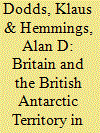

|
|
|
|
|
| Publication |
2013.
|
| Summary/Abstract |
Britain's contemporary and future relationship with the British Antarctic Territory and the wider region is the subject matter of this article. In the aftermath of the ill-fated plans for a merger of British Antarctic Survey (BAS) and the National Oceanography Centre, it is timely to ask how the UK projects influence and secures its scientific, resource and strategic interests. The contemporary Antarctic is increasingly characterized by tension over resource management and conservation politics as Antarctic Treaty parties disagree, both in private and public, over the purpose of legal instruments and the regulation of activities such as fishing and marine conservation. While we do not predict the collapse of the Antarctic Treaty System (ATS), our analysis suggests that the effectiveness and legitimacy of the ATS is increasingly under challenge. The United Kingdom's position as a claimant state and original signatory to the Antarctic Treaty is complicated by the presence of counter-claimants (Argentina and Chile) and a wider preoccupation with other overseas territories, such as South Georgia and South Sandwich Islands and the Falkland Islands. Polar science, carried out by BAS and other British agents, remains critical not only for maintaining the UK's 'soft power' but also increasingly for cementing a 'strategic presence' in the Antarctic. The article ends with a cautionary note: scientific excellence is no longer sufficient to guarantee geopolitical/strategic interests and there is growing evidence that claimant and non-claimant states alike are no longer regarding Antarctica as an area that will remain free of intensifying and diversifying resource exploitation.
|
|
|
|
|
|
|
|
|
|
|
|
|
|
|
|
| 2 |
ID:
124761
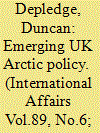

|
|
|
|
|
| Publication |
2013.
|
| Summary/Abstract |
How is the United Kingdom engaging with changing geopolitics of the Arctic in the twenty-first century? This article considers the UK's contemporary interest(s) in the Arctic at a time of unprecedented change in the northern latitudes of our planet. In particular, it focuses on the ongoing emergence of UK Arctic policy as an assemblage of processes involving various actors-government officials, scientists and other academics, environmental campaigners, journalists and the private sector-which not only define UK interests but also delimit what the term 'Arctic' means to, and demands of, the UK. The focus of the article is directed at the recent activities by the Ministry of Defence, the House of Commons Environmental Audit Committee and the related work of the Foreign and Commonwealth Office to develop an Arctic Policy Framework, drawing on official government documents and a series of interviews conducted between 2010 and 2013 for evidence. The article concludes with the author's thoughts on tensions and contradictions that remain in the UK's policy towards the Arctic and the implications this might have at a time when global interest in the Arctic is growing rapidly.
|
|
|
|
|
|
|
|
|
|
|
|
|
|
|
|
| 3 |
ID:
124763
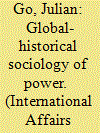

|
|
|
|
|
| Publication |
2013.
|
| Summary/Abstract |
Michael Mann's long-anticipated volumes, the sources of social power, volume 3: global empires and revolution, 1890-1945 and the sources of social power, volume 4: globalizations, 1945-2011 complete Mann's career-spanning project. Compared to previous volumes in the series, these works are much more global in scope. They address topics such as global wars, empires, social citizenship across the industrialized world, economic recessions and climate change. In this way they rectify omissions in Mann's previous work, even while continuing to deploy Mann's previous IEMP (ideological, economic, social, political) model of power. However, three shortcomings remain: first, the books do not adequately deploy the concept of society as power networks; second, they do not offer a conceptualization of global systems or dynamics beyond the sum total of actions by individual states or actors; and third, they retain the standpoint of power in their analyses. Despite these shortcomings, these volumes offer a masterful global history of power over the past century and a half and make long-lasting contributions to the historical sociology of power.
|
|
|
|
|
|
|
|
|
|
|
|
|
|
|
|
| 4 |
ID:
124762
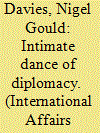

|
|
|
|
|
| Publication |
2013.
|
| Summary/Abstract |
Those who study international relations pay little attention to those who practise them. But the terms of scholarly explanation-the great abstractions of state, interest, power and so on-are always embodied in human representatives, and their interactions mediated through human relationships. The daily experience, lived and felt, of diplomats thus offers a valuable perspective on how international relations work. Two recent studies by Iver Neumann capture this world through an anthropology of the diplomatic tribe. They illuminate the highly distinctive conventions, rituals and symbols of this world, showing how diplomats are recruited and socialized, where and how they perform their roles and how they communicate -and how these practices evolve in the face of social and technological change. Diplomats emerge as indispensable specialists in creating, asserting and agreeing meaning, and diplomatic conduct as a critical variable in explaining international outcomes. Taking the perspective of practice seriously can build a better political science of international relations, balancing first-person understanding with third-person explanation, impersonal forces with human stories, and contextual facts with their rhetorical construction. It can also help bridge the gap between theory and practice. This points to an exciting agenda for future research
|
|
|
|
|
|
|
|
|
|
|
|
|
|
|
|
| 5 |
ID:
124746
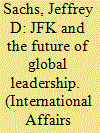

|
|
|
|
|
| Publication |
2013.
|
| Summary/Abstract |
On 10 June 1963 President John F. Kennedy gave a speech that changed the world. His commencement speech at American University helped to spur the signing of a world-changing agreement between the Soviet Union and the United States-the Partial Nuclear Test Ban Treaty. This episode of peacemaking is remarkable for two reasons. First, it arguably helped to save the world, since the nuclear confrontation at that stage of the Cold War was not a 'stable balance of terror', as sometimes described, but rather a highly unstable situation that was prone to accidents, misjudgements and potential disasters. Second, this was an episode of statesmanship in which presidential leadership played a crucial role. Following the Cuban Missile Crisis, Kennedy understood that he bore sole responsibility on the US side to find a way back from the brink of nuclear war. He used the 'peace speech' to create a novel kind of peace diplomacy, and worked together with his counterpart, Soviet leader Nikita Khrushchev, to pull the superpowers back from this precarious brink.
|
|
|
|
|
|
|
|
|
|
|
|
|
|
|
|
| 6 |
ID:
124749
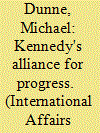

|
|
|
|
|
| Publication |
2013.
|
| Summary/Abstract |
One of the first acts of the new administration of President John F. Kennedy in 1961 was to promote an 'Alliance for Progress' throughout Latin America. JFK's stated goal was 'to transform the American continent' by improving the often desperate living conditions of its peoples; advancing industrialization; diversifying and increasing exports (especially away from heavy dependence on single items such as coffee); encouraging interstate trade and communications; and-above all-strengthening democracy: a term to inspire but one rarely, if ever, defined. The primary means for achieving these ends would be the extension of loans by the United States and others, thereby building up capital for industrial production while increasing food and raw material supplies to maximize foreign exchange-all with the aim of reversing the 'dependency' of 'underdeveloped' Latin America upon the more 'advanced' economies of the north Atlantic area. Kennedy's expressed fear was that Latin America, its impoverished peoples ripe for revolution, would follow the path of Cuba under the new regime of Fidel Castro. In the first part of a two-part analysis the historical and political origins of the Alliance are traced to both US and Latin American sources, including schemes within the Organization of American States and 'Operation Pan America'; in the second part the economic failures and the strategic successes of the Alliance during the presidencies of Kennedy, Lyndon B. Johnson and Richard M. Nixon will be evaluated as another, if varied, stage in the evolving 'hegemonic presumption' of the US towards its southern neighbours
|
|
|
|
|
|
|
|
|
|
|
|
|
|
|
|
| 7 |
ID:
124745
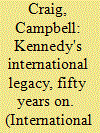

|
|
|
|
|
| Publication |
2013.
|
| Summary/Abstract |
This article explores historical assessments of the foreign policy of President John F. Kennedy, who was assassinated fifty years ago. It traces the evolution of JFK historiography from the uncritical so-called 'Camelot' school to harsh revisionist critiques in the 1980s and 1990s, and on to the current 'third wave' of scholarship. The article focuses in particular on new work concerning JFK's handling of the Berlin and Cuba superpower crises, his role in expanding the United States' involvement in Vietnam (and whether blame for this war can be assigned to him) and larger questions about his approach to the danger of nuclear holocaust and the possibility of defusing Cold War tensions. The conclusion to the article examines his various peace-seeking initiatives in the months following the Cuban Missile Crisis, and suggests that Kennedy may have been turning towards a more critical view of American Cold War politics when he was killed in Dallas in November 1963
|
|
|
|
|
|
|
|
|
|
|
|
|
|
|
|
| 8 |
ID:
124753
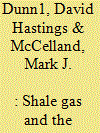

|
|
|
|
|
| Publication |
2013.
|
| Summary/Abstract |
The spectre of American decline is once again animating both observers and practitioners of US foreign policy. The global financial crisis, a faltering American economy and continued costly and controversial military engagements overseas have been presented as conclusive proof that American foreign policy will soon lack the resources needed to sustain its previous international hegemony. Arguments of domestic weakness have been linked to analyses of the economic vitality of America's competitors to demonstrate a seemingly watertight case for relative decline. The inexorable rise of China has been presented from various quarters as evidence that the American era will soon be drawing to a close. Yet, such declinist arguments continue to suffer from fundamental weaknesses, overestimating the likely future strength of America's rivals while concurrently downplaying the capacity of the US to rejuvenate its economy and thus revivify its liberal universalist creed. The most interesting development in this regard has been the sudden resurgence of the US energy sector. Written off less than a decade ago as being in terminal decline, the American oil and gas industry has staged a remarkable recovery. Vast reserves of shale gas and accompanying tight oil offer the potential to aid the revival of the American economy, with some forecasts pointing to US energy self-sufficiency within two decades. Notions of US relative decline may yet prove premature. The geopolitical impact of American energy self-sufficiency is likely to be very significant, making an important contribution to a reversal of the US trade deficit, a revival of America's industrial base, and the possibility of a corresponding relative decline in power for conventional fossil fuel exporters.
|
|
|
|
|
|
|
|
|
|
|
|
|
|
|
|
|
|
|
|
|